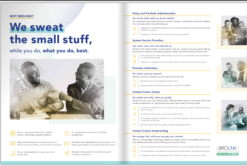
Cheaper Insurance Can Cost SMMEs Dearly


Make smart decisions to avoid the pitfalls
The combination of a falling Rand, tight budgets and diminishing profit margins, has seen a rise in cost cutting in businesses. Insurance is one area that businesses put under the microscope when the pressure is on – but uninformed cost cutting can have disastrous consequences.
Peter Olyott, Managing Director of Indwe Risk Services, cautions, “Too little of the right cover or too much of the wrong cover makes a business very vulnerable. When evaluating insurance portfolios, we often notice clients deliberately underinsuring in order to keep the insurance premium down. It is preferable to insure at the correct catastrophe levels but use an increased excess or deductible to achieve the same premium-saving effect.”
Paying attention only to the premium side of the equation obscures the fact that businesses buy insurance to protect themselves against the risk of loss, not to get the cheapest premium. Reducing the premium to achieve a short-term objective can bring about an unintended increase in risk exposure for the business. For example, saving R200 per month on your insurance for three years does not achieve the desired result when in year two or three a claim of R60 000 is rejected.
Insurance can be a highly technical and complex contract and as a result, it requires the skill and input of an experienced and professional insurance broker. Such a broker is able to identify and highlight the changes in risk exposures that come with premium saving. Always ensure that you fully understand the potential outcomes of your risk decision-making – and never assume that lower premiums come without attachments or consequences.
Appropriate cover takes the nuances of your business into account and makes sure that your best interests are always paramount. Issues that need evaluation and discussion are brought to your attention – you have someone on your side who understands the insurance terminology and what it entails for your particular situation.
Olyott adds, “Consider the following when you select a broker: expertise and knowledge of your type of business, ability to explain and convey in plain terms what is and is not provided by particular insurance covers. Consider their ability to provide cost effective and sensible alternatives to assist you in meeting your budget constraints without unduly exposing your business. And finally, you want a broker who actively demonstrates that they put your needs first”
The bottom line is – don’t compromise. Don’t make the mistake of being penny wise and pound foolish when it comes to insurance. Always ask the hard questions prior to the claim, not afterwards when it is too late.
Source: Indwe Risk Services


